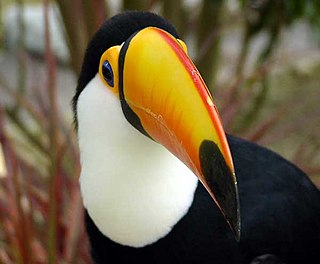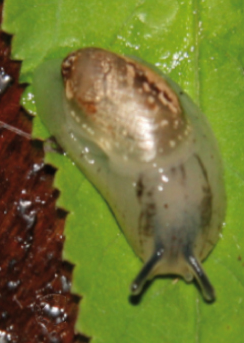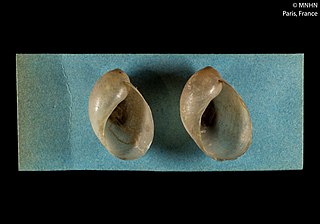Related Research Articles

Huntsman spiders, members of the family Sparassidae, are known by this name because of their speed and mode of hunting. They are also called giant crab spiders because of their size and appearance. Larger species sometimes are referred to as wood spiders, because of their preference for woody places. In southern Africa the genus Palystes are known as rain spiders or lizard-eating spiders. Commonly, they are confused with baboon spiders from the Mygalomorphae infraorder, which are not closely related.

The North Region of Brazil is the largest region of Brazil, corresponding to 45.27% of the national territory. It is the second least inhabited of the country, and contributes with a minor percentage in the national GDP and population. The area of the region is slighty larger than India or the whole European Union. It comprises the states of Acre, Amapá, Amazonas, Pará, Rondônia, Roraima and Tocantins.

The wildlife of Brazil comprises all naturally occurring animals, plants, and fungi in the South American country. Home to 60% of the Amazon Rainforest, which accounts for approximately one-tenth of all species in the world, Brazil is considered to have the greatest biodiversity of any country on the planet. It has the most known species of plants (60,000), freshwater fish (3,000), amphibians (1,188), snakes (430), insects (90,000) and mammals (775) It also ranks third on the list of countries with the most bird species (1,971) and the third with the most reptile species (848). The number of fungal species is unknown. Approximately two-thirds of all species worldwide are found in tropical areas, often coinciding with developing countries such as Brazil. Brazil is second only to Indonesia as the country with the most endemic species.

Bulimulidae is a taxonomic family of medium-sized to large, air-breathing, tropical and sub-tropical land snails, terrestrial pulmonate gastropod molluscs in the superfamily Orthalicoidea.

Tarantulas comprise a group of large and often hairy spiders of the family Theraphosidae. As of December 2023, 1,100 species have been identified, with 166 genera. The term "tarantula" is usually used to describe members of the family Theraphosidae, although many other members of the same infraorder (Mygalomorphae) are commonly referred to as "tarantulas" or "false tarantulas". Some of the more common species have become popular in the exotic pet trade. Many New World species kept as pets have setae known as urticating hairs that can cause irritation to the skin, and in extreme cases, cause damage to the eyes.

An endangered species is a species that is very likely to become extinct in the near future, either worldwide or in a particular political jurisdiction. Endangered species may be at risk due to factors such as habitat loss, poaching, and invasive species. The International Union for Conservation of Nature (IUCN) Red List lists the global conservation status of many species, and various other agencies assess the status of species within particular areas. Many nations have laws that protect conservation-reliant species which, for example, forbid hunting, restrict land development, or create protected areas. Some endangered species are the target of extensive conservation efforts such as captive breeding and habitat restoration.
The Junqueira cow is a cattle breed from Brazil that is the result of crosses between Caracu and other Brazilian varieties. It is of the subspecies Bos taurus ibericus and has submetacentric Y chromosomes, suggesting it is taurine in origin. The breed has been raised since the 18th century, in São Paulo but only about 100 remained in 2005. However, it has been cloned in the laboratory by the Brazilian Agricultural Research Corporation. Early on, its long horns were used to manufacture berrantes. Today, the Junqueira cow is an endangered species, with fewer than 100 left in Brazil.

Amphibulima browni is a species of air-breathing land snail, a terrestrial pulmonate gastropod mollusk in the family Amphibulimidae.

Amphibulima pardalina is a species of tropical air-breathing land snail, a pulmonate gastropod mollusk in the family Amphibulimidae.

Drymaeus laticinctus is a species of tropical air-breathing land snail, a pulmonate gastropod mollusk in the family Bulimulidae.

Rhodonyx rubescens is a species of tropical air-breathing land snail, a pulmonate gastropod mollusk in the family Amphibulimidae.
Drymaeus multifasciatus is a species of tropical air-breathing land snail, a pulmonate gastropod mollusk in the family Bulimulidae.
Drymaeus liliaceus is a species of tropical air-breathing land snail, a pulmonate gastropod mollusk in the family Bulimulidae.

Simpulopsidae is a taxonomic family of air-breathing land snails, terrestrial pulmonate gastropod molluscs in the superfamily Orthalicoidea.

Leiostracus is a genus of small to medium-sized neotropical, air-breathing land snails, pulmonate gastropod mollusks in family Simpulopsidae.

Leiostracus vittatus is a species of tropical air-breathing land snail, a terrestrial pulmonate gastropod mollusk in the family Simpulopsidae.
Leiostracus faerie is a species of tropical air-breathing land snails, a terrestrial pulmonate gastropod mollusc in the family Simpulopsidae.
Leiostracus carnavalescus, or Harlequin Snail, is a species of tropical air-breathing land snail, a terrestrial pulmonate gastropod mollusc in the family Simpulopsidae.
Leiostracus demerarensis is a species of tropical air-breathing land snail, a terrestrial pulmonate gastropod mollusc in the family Simpulopsidae.
References
- ↑ Salvador, R. B.; Cavallari, D. C. (2014). "A new species of Leiostracus from Bahia, Brazil (Gastropoda, Pulmonata, Orthalicidae)" (PDF). Iheringia, Série Zoologia. 104 (1): 39–42. doi: 10.1590/1678-4766201410413942 . ISSN 0073-4721.